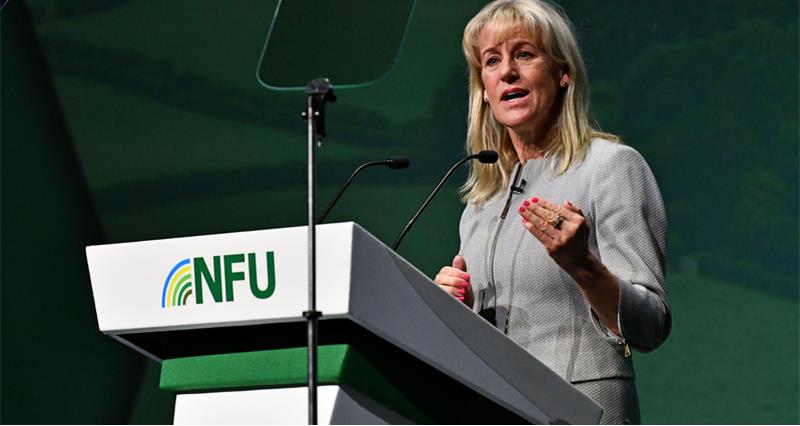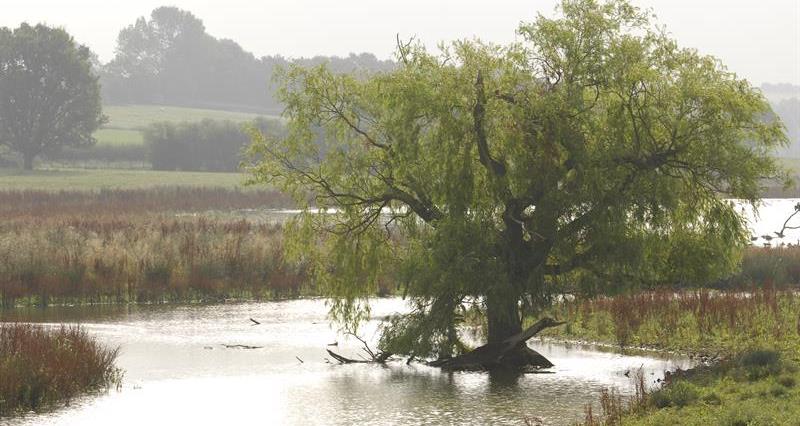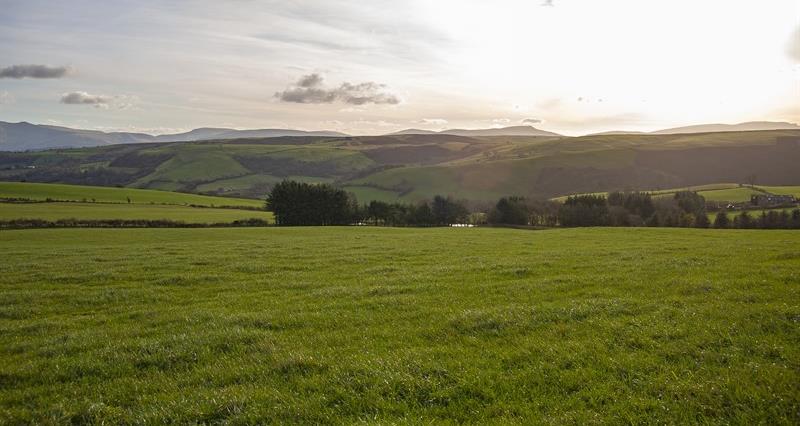Good morning everybody and welcome to Conference.
I’m delighted to start by sharing the news that the Prime Minister will be joining us shortly to give the keynote political address from the stage this year.
But until then, you’ve got me, albeit for the last time Conference.
There has been no playbook for my time leading the NFU. Each year has brought challenges that we haven’t faced before.
So I do want to start by saying an enormous thank you to my fellow officeholders in England and Wales, both past and present, for all their support.
It’s been quite a decade. In 2014, when I was elected Deputy President, the UK was a full member of the European Union. I became President in 2018 and we immediately went to the cliff edge, not once but three times, with a catastrophic ‘no deal Brexit’.
My second term started in 2020. Within a month Covid-19 had struck, we were in lockdown and leading the NFU from our farms. Our staff were all working from home and a combination of Prime Minster Boris Johnson and President Trump were committed to concluding a US/UK free trade agreement by August.
Let’s not forget, the Johnson government was legislating on raising standards of animal welfare and environmental protection here at home, but that same government was only too happy to import food that would be illegal to produce here.
It was a morally bankrupt position.
‘One of the most successful campaigns of modern times’
We knew time was not on our side and we brought together an unprecedented coalition of farming organisations, environmental NGOs, animal welfare experts, consumer groups and chefs, headed up by Jamie Oliver.
It was one of the most successful campaigns of modern times, and a testament to the convening power and influence of the NFU.
Well over one million people signed our petition and, on one memorable Sunday in May, we asked our supporter base to email their MPs – more than 80,000 emails were sent. MPs didn’t like it, but they had to listen.

This time the British people took back control, drew a line in the sand and said no to hormone-treated beef and chlorine-washed chicken.
Getting members’ interests heard
As President, I’ve worked with four Prime Ministers – three in one year – and six Defra Secretaries of State. My mission with each of them, has been to get your interests heard, understood and acted upon, and that has never been more important than in the post-Brexit world.
That’s why, in August 2022, we invited both the candidates for the leadership of the Conservative Party to a special NFU leadership hustings. It was at that event Rishi Sunak outlined a refreshingly different approach to food and farming on trade, procurement and food security.
The Prime Minister stuck to the commitment he made then by hosting the first ever Downing Street Food Summit in May last year. At the summit, the PM put in writing that “not now, not ever” will we be importing hormone treated beef or chlorine-washed chicken.
This was the moment to remind ministers that although agriculture is always the first chapter to be discussed in a trade deal, it’s the last chapter to be agreed.
“It was one of the most successful campaigns of modern times, and a testament to the convening power and influence of the NFU.”
NFU President Minette Batters
This is why it was right that the UK Government stuck to its commitment and had the courage to walk away from the enhanced trading relationship with Canada, who have always been determined to get their hormone treated beef onto our market.
Of course, everything in 2022 was overshadowed by Russia’s illegal invasion of Ukraine, when the full horror of a war in Europe took hold.
Conference, I know the thoughts, prayers and hopes of the UK agricultural community continue to be with the people and farmers of Ukraine. My conversations with Mariia Didukh, Director of the Ukrainian Agrarian Forum, have been continuing reminders that we should never take peace for granted.
The economic impact of the war here in the UK was immediate. At one point the wholesale gas price increased by 600% and UK farmers and growers were faced with triple digit inflation on all our input costs. Consumers faced rationing of eggs due to retailers and packers failing to pay for the high costs of production.
‘Water security must underpin national food security’
Of course, it is not just global events that have challenged British agriculture in 2023. Here at home extreme weather has hit us hard.
Many parts of the country remain flooded. Some winter crops didn’t get planted and some of those that did have been washed away. In places, sugar beet and potatoes remain rotting in the ground and many of our food producing floodplains have been used to store water to protect houses and businesses.
You heard from Henry Moreton in our opening video about the devastating impact of flooding in Lincolnshire; imagine if other industries were expected to store water every winter at their own cost without compensation.
We must pay farmers for storing flood water on their land.
We must speed up planning for on farm reservoirs to store water for crop irrigation.
Water security must underpin national food security. In a world that is becoming more water insecure, the wasting of diffuse water into the sea has to end.
Mental health in farming pushed to ‘breaking point’
We know how hard farming is sometimes. We know the toll it can take. We know that mental health for many in farming is being pushed to breaking point.
Our own NFU farmer confidence survey shows that, for the first time since it started, short and mid-term confidence is low.
The recent reporting from Farm Community Network makes stark reading – a combination of the lack of a plan to give certainty for the future of farming and transitioning away from the Basic Payments Scheme is causing huge concern. NFU CallFirst and our farming charity helplines are inundated with calls.
“NFU members Andy and Lynda Eadon have had a profound impact on me and many others, with their determination to drive greater mental health awareness on the back of losing their son Len, who so tragically took his own life.”
NFU President Minette Batters
NFU members Andy and Lynda Eadon have had a profound impact on me and many others, with their determination to drive greater mental health awareness on the back of losing their son Len, who so tragically took his own life.
Quite simply, they want to prevent anyone else going through what they have.
Which is why, at the NFU’s Summer Reception in Parliament last year, the focus was not on farming and growing businesses, but on our mental health and wellbeing.
No stone unturned on eradicating bTB
When we talk about mental health challenges, there is often nothing greater than the devastation of a positive TB test.
�ʼһ���will leave no stone unturned to ensure future governments continue to work with us on eradicating bovine TB – it is a disease that continues to wreck lives and livelihoods across England and Wales – it doesn’t respect borders.
Last year alone 29,975 cattle were slaughtered.
My message to all politicians is this: ‘please don’t politicise this hideous disease’. Any government must surely want to have healthy cattle and healthy badgers. To achieve this, we must all continue to use every tool in the toolbox, and Conference, epidemiological culling must be part of any plan.
Farmers need certainty
All of these challenges add to the instability and volatility that farmers and growers are facing, when what they really need is certainty. And what will deliver that certainty is a plan and a statutory underpinning for sustainable food production that matches the same ambition as legislated environmental targets.
As a bare minimum, the remaining 50% of BPS funding should be fully committed to supporting sustainable food production as part of a broad range of actions which include fair dealing in the supply chain, access to seasonal and permanent labour and incentives for the uptake of biotechnology.
Even the Environmental Audit Committee has recently said that our national food security must become part of the ELMS, which must be the right approach.
The Prime Minster will speak from this stage shortly. I’ll be keen to hear what he has to say on these issues.
Building a business for the future
I’m a sixth-generation farmer. When I was first elected it was frustratingly all about being a woman. The real story should have been that I am a tenant farmer on 300 acres – proof that the NFU values small businesses as much as large ones.
My focus, like yours, is to leave my farm in a much better place than when I took it on. To build that business for my children, who are here today.
I have watched and listened as the Welsh Government try and deny our members and their children the farming futures they had planned.
The Welsh Government’s own impact assessment for the Sustainable Farming Scheme predicts 122,200 fewer livestock, 5,500 job losses, and £199 million pound loss to farm incomes.
As it stands, the cannot work. This is a red line Conference – and we will not cross it. We will sit at the same table with Welsh government and find the solution.
In this, as in so many ways across Britain, food production is becoming the poor relation.
“My focus, like yours, is to leave my farm in a much better place than when I took it on. To build that business for my children, who are here today.”
NFU President Minette Batters
In Britain, as a landowner, if you put up a solar farm you will receive between £800 and £1100 per acre, index-linked for a minimum of 20 years.
Imagine if field veg production could receive index-linked payments on a similar basis. Farmers have been financially incentivised to grow maize for anaerobic digestion, so why on earth can’t the English and Welsh farming schemes incentivise farmers to grow protein crops or companion cropping?
The question for all parties prior to a general election is this: Why do other elements of our critical national infrastructure receive guaranteed financial support from the taxpayer when food production does not?
Driving the horticultural revolution
NHS advice is that every single one of us, regardless of our age needs to eat more fruit, vegetables and pulses.
The government has legally binding targets to grow more trees, yet across the country we’re grubbing out our apple and pear orchards.
Currently, almost half of all growers surveyed in December said they were cutting back on investment plans, and we see that starkly with the alarming statistic that just one third as many apple trees were planted in 2023 as growers had planned.
Allowing us to get to this point is madness.
We can, we should, we must, drive the horticultural revolution that we all know is needed.
At the general election I’d like all parties committed to treating food security as the same strategic priority as energy security.
‘Culture at the top of food retail has to change’
Let me turn to supply chain fairness.
There is no one silver bullet on a fair and functioning supply chain. Farming Minister Mark Spencer is to be praised for his leadership on fairness in dairy contracts. The legislation laid in Parliament this week can and must be a blueprint for other sectors.
It took the NFU 10 years to secure the role of the Groceries Code Adjudicator and there’s no doubt it’s transformed the way disputes between supplier and retailer are conducted and resolved.
But there are still many of our members who will not raise a complaint for fear of being de-listed by supermarkets.
Conference, this is wrong, it’s unfair, and totally unacceptable.
In my last address as NFU President, I have a message to all food retailers and, most importantly, to their shareholders.
You have a duty to your farmers and growers. They have a right to earn a fair price for what they produce, for you to sell. This means the culture at the top of food retail has to change.
Right now, the ‘badge of honour’ sits with an often ruthless buyer for negotiating the hardest deal with suppliers.
Retailers should value them more than that. That badge of honour needs to be worn by responsible board members who recognise the importance of long-term supplier relationships.
Conference, we need a blueprint for action. My suggestion is that the Groceries Code Adjudicator survey of suppliers is used to create a new framework.
This would embed retailers’ ethical responsibilities to farmers and growers within their business’s environmental sustainability goals and corporate and social responsibility.
Food is a public good
At the Oxford Farming Conference a few weeks ago, we finally heard a Defra Secretary of State Steve Barclay say that ‘food is a public good’. I was delighted he said it.
As all of you know well, any business, especially when they’ve been through substantive change, reviews their decisions.
As the agricultural transition gathers pace it is essential now that the government conducts a mid-term review to monitor the impact of the SFI (Sustainable Farming Incentive) in the English transition on our national food security, as well as negative impacts on the tenanted sector.
“We must see changes this year to redress the imbalance between environment and food production in government policy before many more farms just simply disappear."
NFU President Minette Batters
It would be nothing short of irresponsible to push on without assessing the impact of change so far.
So, where are we now?
We’ve got schemes designed to replace the basic payment scheme offering £854 a hectare to grow wildflowers.
We have legislated environmental requirements which are driving a new purchaser of land, as we see land being sold to property developers for BNG (Biodiversity Net Gain), private investors buying land for carbon credits from a market that is undefined.
Some celebrities are buying land and taking it out of production to greenwash other parts of their lifestyles.
We must see changes this year to redress the imbalance between environment and food production in government policy before many more farms just simply disappear.
The problem can of course be resolved – we can produce nothing and emit nothing.
The ill-informed utopia where we live on lab-grown meat and gloop produced in factories. This joyless dystopian vision can never replace the benefits of nutrient-rich food grown in soil with water and sunlight.
Hope on the horizon
I’ve noticed over the last ten years that policy makers all too often display a metropolitan view of the world – policy that is frequently not aligned to practical experience in your fields.
Planting trees on our grassland to lower methane emissions is one of those absurd desk-top policy ideas that bypasses the fundamental carbon cycle of life.
But there is hope on the horizon. I have visited the brilliant Wakehurst project in West Sussex which is measuring the value of mycorrhizal fungi and sequestered carbon in grazed grassland. The project is currently being peer reviewed and should revolutionise the way we value the carbon and biodiversity benefits of our grasslands.
The UK and Europe are in grave danger of exporting their production, their standards and their conscience for imports that do not meet those same standards.
It cannot be an either/or. The only way forward is to place as much value on the production of food as we do on protecting our environment. I’ve always said these things are two sides of the same coin.
The problem is this, natural capital – the resources on which all life depends – is not written into the system,
There is no value for them. Our national accounting framework doesn’t quantify the value of nature – we measure GDP in terms of consumption; cars, laptops, services.
We don’t measure the building blocks of life. So, what needs to happen to correct this?
Both the English and Welsh farming schemes could and should be the blueprint for success, not just across the UK but across the world.
The sustainable farming schemes of the future must be grounded in science, not on hope and wishful thinking – government needs to help define new environmental markets that can be stacked on a farmed landscape.
There is a reason why countries invest in food production. It is to mitigate risk and volatility for consumers and give farmers the confidence to keep producing food.
And yet, we are engaged in a precarious experiment moving money from food production to other areas and reducing certainty that is needed.
Policy makers should be helping British farmers deliver more food, energy and fibre with less impact, using fewer resources.
British public behind us ‘every step of the way’
The evidence is clear – the British public is behind us every step of the way.
During 2023, farming and growing rose to second in the list of professions most valued by the public, behind only nursing. I’m proud of that, I hope you are too – you should be, you’ve earned that respect and recognition.
That’s something our politicians should remember too – the British public values farmers very highly indeed; as pollster Joe Twyman will demonstrate with powerful data tomorrow.
I know how much that means to NFU members and on your behalf I want to say thank you today to everyone outside this room for their support. It makes all the difference.
I’m proud of the NFU, proud of what we’ve done and what we’ll do in the years to come.
Believe me, I know more than anyone given the political turmoil of recent years, that you never know who you’ll be working with next. That’s why I’m proud that the NFU is a truly apolitical organisation.
“I know how much that means to NFU members and on your behalf I want to say thank you today to everyone outside this room for their support.”
NFU President Minette Batters
Which political party will have the right plan for British food?
In the run up to a general election, the ability to work well with all parties is critical.
The title of our manifesto is: ‘Farming for Britain’s Future’ and that’s a title chosen carefully. This election will be critical to the future of farming and the food on our supermarket shelves, in our pubs, hotels, bars and restaurants.
Which political party will have the right plan for British food?
Which party will introduce a minimum five-year rolling seasonal worker scheme and recognise that we need more people, if we’re to continue providing the raw ingredients for the country’s largest manufacturing sector?
Which party will formally commit to sourcing more food from British farms for our schools, hospitals and military?
We managed to be 100% British sourced food for the London Olympics – we did it then, we can do it now. Government lawyers must stop hiding behind state aid rules.
Which party will be the first to set a target for food production with a statutory underpinning?
Who will bring Defra together with one ambition, balancing food and environment?
Which party will deliver the core standards that ensures food imports meet the same high values of animal welfare and environmental protection as those which British farmers are expected to meet?
In conclusion conference, the NFU was founded in 1908 to restore credibility and integrity to farming.
Those words matter as much now as they did then.
We must all challenge the growing surge of populism and theoretical policies, often delivered by press releases and soundbites on social media. �ʼһ���is an organisation led by farmers for farmers, with technical input from our phenomenal professional staff.
NFU will be fighting hard on your behalf
There are many of our European farming colleagues here today. We stand in unity with them because the stakes are high, and the pressure is on all of us to deliver on the first duty of any farmer – to continue producing food.
I know the NFU will be fighting for it hard, every day. And I’ll be supporting it every step of the way – as a member, as a farmer back in Wiltshire.
I always end my speech with the words “thank you Conference”. This year that “thank you” is not just for listening to me this morning, it’s for the opportunity you gave me, for your trust, for your support, and, most of all, for doing what you do every day on your farms and in your businesses, whatever the weather, whatever the challenges, on behalf of the British people.
It has meant everything to me that you gave me the chance to lead the fight on your behalf.
For that, more than anything, thank you conference.






